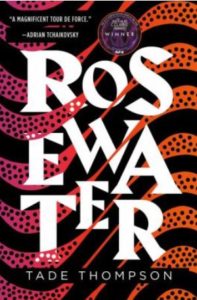 Rosewater is a doughnut-shaped town north of Lagos in the year 2066. In the center of town is a slowly rising dome, sealed off from the ring-town except once a year when a portal opens and magic fairy dust comes out that heals the sick. Unlike other healing places like Lourdes, however, the dome sometimes gets it wrong and the supplicant ends up with an extra arm or leg, or possibly one less than before. It’s not perfect. That’s a fantastically creative setup for a story, and there’s a lot of promise in this sci-fi-speculative novel.
Rosewater is a doughnut-shaped town north of Lagos in the year 2066. In the center of town is a slowly rising dome, sealed off from the ring-town except once a year when a portal opens and magic fairy dust comes out that heals the sick. Unlike other healing places like Lourdes, however, the dome sometimes gets it wrong and the supplicant ends up with an extra arm or leg, or possibly one less than before. It’s not perfect. That’s a fantastically creative setup for a story, and there’s a lot of promise in this sci-fi-speculative novel.
The dome is, or houses an extraterrestrial that emanates fungus spores that fill the air. Certain humans, the “sensitives” can use the fungus as a kind of psychic network. The hero, Kaaro, is a sensitive, but he often misses just plain old relationships with people and does not want to read their mind, so he turns of his psychic powers by rubbing on an antifungal cream. The analogy between a fungal rhizome and a psychic internet is fantastic, another very creative setup for a story.
Kaaro is a morally ambiguous main character and first-person narrator who works as a government agent assisting in the torture of political opponents. He reads their minds and passes the information on to the interrogators, beaters and electricians. Does that arm’s length absolve him of moral culpability? Not for me. I found him to be a wholly reprehensible character, which is not always a deal-breaker. Hannibal Lecter was also reprehensible, but at least he was interesting.
Kaaro, the main character in Rosewater, is a cipher, which is odd for a telepathic first-person narrator. For all his psychic powers and dreamlike visions, I never had a sense of who he is or what he wants. He’s interesting when you meet him, but then you realize nobody’s home under the tough-guy surface. His relationship with his girlfriend is perfunctory, full of snappy one-liners but devoid of intersubjectivity.
The novel starts with tremendous psi-fi promise but settles into disjointed action scenes that define wasted opportunity. Despite the promising “technology” of the psychic fungal network, there isn’t much scientific plausibility to this tale, and surprisingly, despite the hero’s psychic ability, we don’t learn much about the mind, which is full of colorful images, fears and hopes, apparently, but that’s not exactly new news. We get a few glimpses of how difficult being a telepath among normals would be. But overall, the book is not an exploration of consciousness, telepathy, or even of extraterrestrials. It has more emphasis on political power than on psychology. So while it has great psi-fi potential, the payoff is missing, and the book counts only as a speculative romp.
Thompson, Tade (2010). Rosewater. New York: Orbit/Hachette, 390 pp.